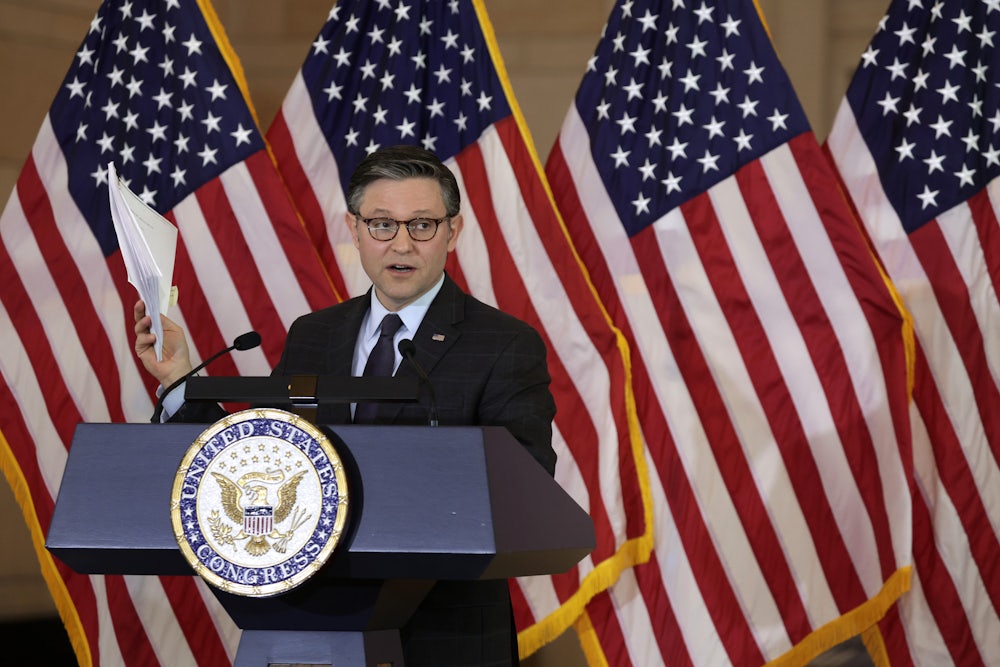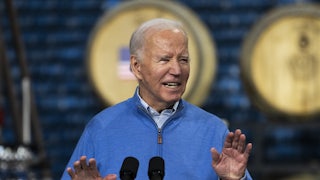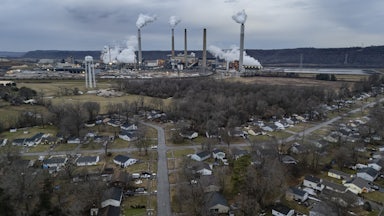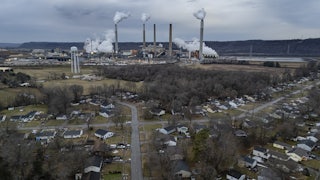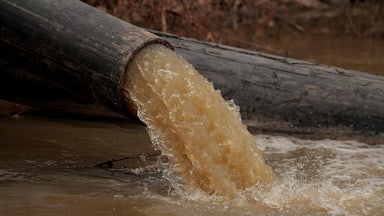Embattled House Speaker Mike Johnson is reportedly considering a deal to trade additional military aid for Ukraine—a top priority for Democrats, opposed by many Republicans—for some kind of grand bargain to end the White House’s temporary pause on approving new liquefied natural gas export terminals, announced in January. Appearing on Fox News on Easter Sunday, asked about the potential for getting an agreement on Ukraine funding, Johnson somewhat obliquely referenced hopes to “unleash American energy; have national gas exports that will un-fund Vladimir Putin’s war effort.”
There are virtually no other details as to what such an agreement might look like, and reporting on the matter hasn’t really helped clear things up. While Republicans and the fossil fuel industry have falsely painted the White House’s temporary pause on new export terminal approvals as a “moratorium” on LNG exports, Hill reporters are also now echoing this misleading language. Politico called it a “pause on natural gas exports.” Just about the opposite is true: The United States sold more LNG than any other country last year and broke gas production records. It has produced more crude oil than at any point in its history for the last six years running, and has led the pack of countries embarking on new oil and gas development for the last two. All that new exploration and drilling is helping to put even modest climate goals out of reach.
Nothing about this temporary pause—again, not a pause on exports themselves but merely on new export terminal approvals—will put an end to that boom, and it has no bearing at all on the great many number of export facilities that are either currently operational, under construction, or already approved. As I wrote in January, the pause is meant in large part to update the guidance that regulators use to greenlight such projects, important parts of which haven’t been updated since 2012—years before the U.S. embarked on its LNG export boom. Panicked about subjecting gas to even basic scientific scrutiny about its economic and climate impacts, House Republicans have already held hearings and passed a bill to roll back the decision. Sixteen red states have sued the Department of Energy over it.
For a far-right Republican from Louisiana—a major oil and gas producing state that’s home to three of the country’s seven operational LNG export terminals—it’s not exactly surprising that Johnson would be looking for some excuse to boost gas; the highest-profile project held up by the deal, Calcasieu Pass 2, is in his home state too. Days before the original Calcasieu Pass facility began operations, in January 2022, it leaked 180,000 pounds of unpermitted methane gas into the air.
If there’s one thing that a fractured Republican caucus has in common, it’s that virtually all of them take money from fossil fuel interests. Of the House’s 218 Republicans, 209 have taken donations from the oil and gas industry this cycle. Johnson has gotten more cash from political action committees linked to oil and gas companies ($73,300) this cycle than from PACs for any other industry. He got $17,034 from Cheniere, a major gas company. Overall, oil and gas interests have been a reliable top donor to Johnson, having given the speaker $472,473 since the start of his congressional career.
Democrats, thankfully, seem to agree that Johnson’s idea would be a bad idea, either for climate reasons or because they think it’d trigger more delays with Ukraine funding. The White House has not commented on the proposal. The Republicans who’ve blocked Johnson’s previous spending efforts reportedly aren’t too charmed by it, either. His plan, if you can call it that, appears to be dead in the water. Other efforts to end the pause, though—to keep careening toward a massive LNG buildout federal regulators don’t fully understand—are alive and well.
